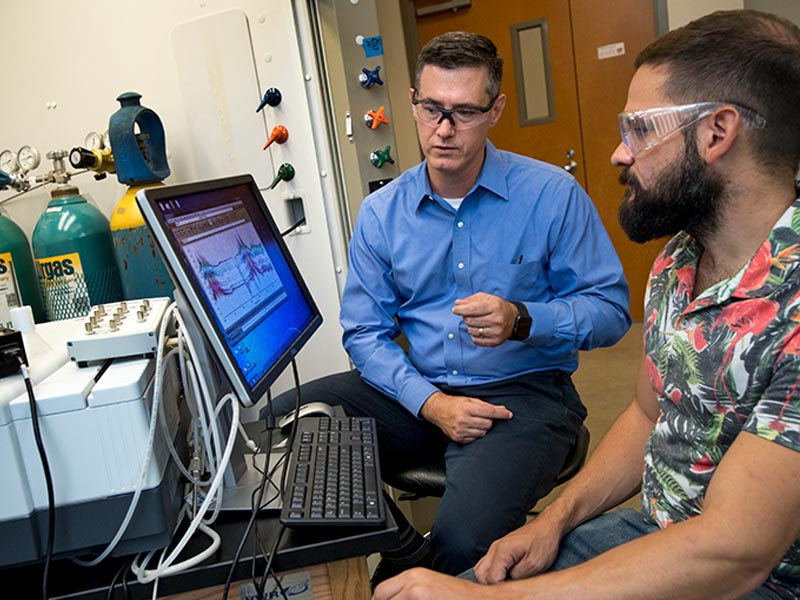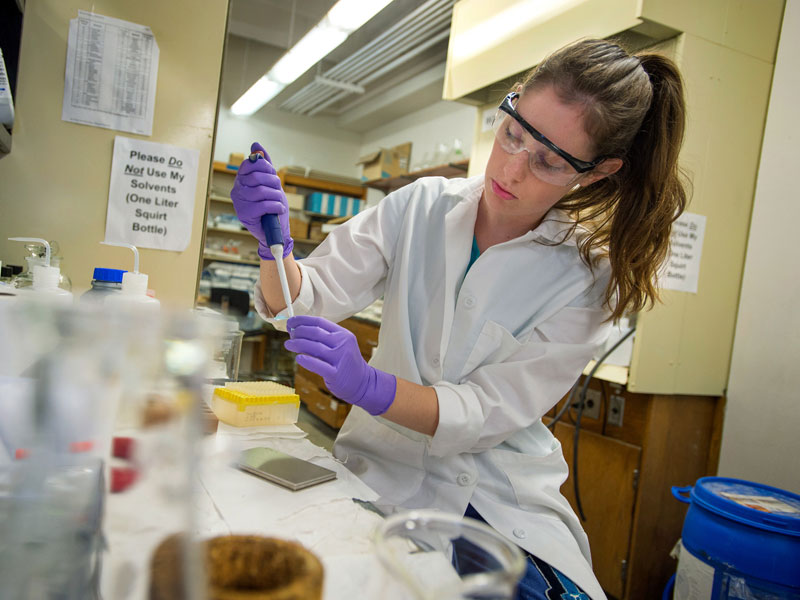About Us
The mission of the Department is to provide the highest quality programs to educate students at all levels in the principles and applications of Chemical and Biomolecular Engineering, within the environment of Tulane University. As part of this mission, students perform innovative and high quality research that advances engineering solutions as applied to health, energy, and the environment.
The mission of the Department is to provide the highest quality programs to educate students at all levels in the principles and applications of Chemical and Biomolecular Engineering, within the environment of Tulane University. As part of this mission, students perform innovative and high quality research that advances engineering solutions as applied to health, energy, and the environment.
Vision Statement
We strive to be internationally recognized as a leading chemical and biological engineering department that exemplifies the dual commitment of outstanding research and education, producing high quality graduates who are creating knowledge and developing innovations.
Distinctive Features of Our Program
- Small class size (high faculty-to-student ratio) with individualized attention to students at all levels.
- Discovery-based research at the molecular level with strengths in materials, biomolecular and interface sciences, bioengineering, and molecular modeling and simulation
- Opportunities for undergraduates to carry out research
- Opportunities to interact with the major chemical industries along the Gulf Coast
- Interdisciplinary research with Tulane Medical School, Tulane School of Public Health and Tropical Medicine, the Departments of Chemistry, Cell and Molecular Biology, Physics and Engineering Physics, and the Neurosciences Program
- Entrepreneurial research opportunities related to the unique environment of the coastal and deltaic region
- A rich and unique cultural environment in the New Orleans area and a campus culture that embraces civic engagement
Accreditation
Tulane's Chemical Engineering program is accredited by the Engineering Accreditation Commission of ABET, under the commission’s General Criteria and Program Criteria for Chemical, Biochemical, Biomolecular, and Similarly Named Engineering Programs.
In 1894, Tulane University was the first school in the South and the third in the United States to establish a four-year curriculum labeled Chemical Engineering. The program had it roots in Chemistry with the first curriculum being based on Industrial Chemistry. In 1895, B. P. Caldwell was the first recipient of the B.E. degree in Chemical Engineering at Tulane.
Today the department continues a strong tradition of rigorous learning coupled with the joy of discovery. The department values scholarship and seeks to provide its students with all opportunities to develop their academic potential. Class sizes are small and the student to faculty ratio in the department is typically less than 10:1. The faculty has an open-door policy and is accessible to students at all times of the working day. There are tremendous opportunities for undergraduates to participate in research, and the faculty encourages and promotes undergraduate involvement in research. The department has ten faculty members and sustains an intensive graduate research program leading up to the doctoral degree.
We welcome you to look through our website and learn more about the department, its people, and its educational and research opportunities.
Juergen Hahn
Professor and Head, Department of Biomedical Engineering
Rensselaer Polytechnic Institute
Carol Hall
Camille Dreyfus Distinguished University Professor
NC State University
Miriam E. John, Chair of Board
Vice President Emeritus
Sandia National Laboratories
Alon McCormick
Professor, Dept. of Chemical Engineering & Materials Science
University of Minnesota
Terrance C. Osby
Olefins Planning- Basic Chemicals Technology
Exxon Mobil
Shepard F. Perrin, III
Procurement Manager
INEOS Olefins & Polymers USA
Hadley Sikes
Esther and Harold E. Edgerton Associate Professor
Massachusetts Institute of Technology
Blake Simmons
Division Director, Biological Systems and Engineering
Lawrence Berkeley National Laboratory
Michael Spaid
President and CEO
ConductiveBio
Franz Vogt, PE
Rain CII
Akira Yato
Facilities Manager and Senior Development Engineer
Kyocera Industrial Ceramics Corporation
Early-career Board of Advisors
Alec Walker (chair)
Class of 2018
Bayer
Sam Copper
Class of 2019
Phillips 66
Chris Aubin
Class of 2018
LyondellBasell
Melissa Lieberson
Class of 2019
Bayer
Sean Madsen
PhD 2020
Bristol-Myers Squibb
Patrick Kimes
Class of 2020
J.M. Smucker Co.
Ila Keshishian
Class of 2022
Merck
Andrew Kese
Class of 2023
Rystad Energy
Henry Lively
Class of 2015
INEOS
Hailey Hayes
Class of 2024
Venture Global
Chloe Camel
Class of 2024
Shell Geismer
Emeritus Members
Helen Armer
Applied Materials
Joseph F. Boston
President (Retired)
Aspen Technology, Inc.
Robert F. Buesinger
General Manager, Alpha Olefins
Global Business Unit, Chevron Phillips Chemical
Eduardo Glandt
Dean, School of Engineering & Applied Sciences
University of Pennsylvania
Lisa P. Jackson
Former Administrator, U.S. Environmental Protection Agency
Vice President, Environmental Initiatives, Apple
Judy Kron
Corporate Human Resources
DuPont Co.
Douglas A. Lauffenburger
Professor and Chair, Biological Engineering
Massachusetts Institute of Technology
Clarence I. Lewis, Jr. (Clay)
Executive Vice President (retired)
ExxonMobil Corporation
Pramthesh (Prem) Patel
Director, Microbial & Cell Culture Development
Glaxo, Smith, & Kline
Ponisseril Somasundaran (Som)
La von Duddleson Krumb Professor of Mineral Engineering
Henry Krumb School of Mines, Columbia University
George A. Swan, III
Distinguished Engineering Associate
ExxonMobil Process Research Laboratories


